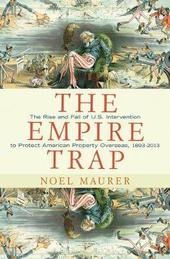
|
The Empire Trap: The Rise and Fall of U.S. Intervention to Protect American Property Overseas, 1893-2013
Hardback
Main Details
| Title |
The Empire Trap: The Rise and Fall of U.S. Intervention to Protect American Property Overseas, 1893-2013
|
| Authors and Contributors |
By (author) Noel Maurer
|
| Physical Properties |
| Format:Hardback | | Pages:568 | | Dimensions(mm): Height 235,Width 152 |
|
| Category/Genre | International economics
Economic history |
|---|
| ISBN/Barcode |
9780691155821
|
| Classifications | Dewey:337.7300904 |
|---|
| Audience | | Tertiary Education (US: College) | | Professional & Vocational | |
|---|
| Illustrations |
1 Maps
|
|
Publishing Details |
| Publisher |
Princeton University Press
|
| Imprint |
Princeton University Press
|
| Publication Date |
25 August 2013 |
| Publication Country |
United States
|
Description
Throughout the twentieth century, the U.S. government willingly deployed power, hard and soft, to protect American investments all around the globe. Why did the United States get into the business of defending its citizens' property rights abroad? The Empire Trap looks at how modern U.S. involvement in the empire business began, how American foreig
Author Biography
Noel Maurer is associate professor of business administration at Harvard Business School. He is the author of "The Power and the Money" and coauthor of "The Politics of Property Rights, Mexico since 1980", and "The Big Ditch" (Princeton).
Reviews"[T]his is a very good book--cogently argued, detailed, and well-written."--Politics Reader "The Empire Trap represents an important addition to scholarship on twentieth century U.S. foreign policy. Maurer convincingly demonstrates that American investments in foreign countries were repeatedly threatened by expropriating governments and that in countless instances the United States utilized a variety of methods to protect those investments or to ensure fair compensation when they were lost."--Jeffrey Malanson, Enterprise & Society "It is impressive not only for its scope ... but also for its attention to detail in each of the cases presented. Most important, Maurer's analysis brilliantly captures a big picture that challenges much of the conventional wisdom showing how a small number of private investors draw government into one international quagmire after another because it was the only way they could have their property rights enforced."--Alan Dye, EH.Net "This is an exemplary work of historical social science, shedding light on many debates within the international relations literature."--Michael J. Lee, Perspectives on Politics
|